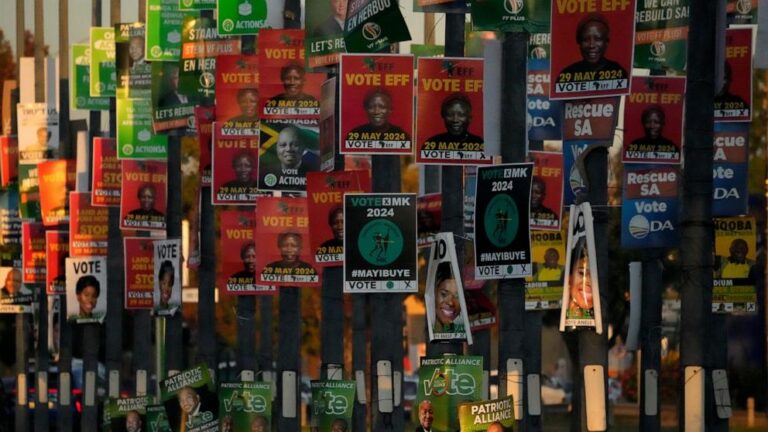CAPE TOWN, South Africa — South Africans will vote Wednesday to decide whether the country will take its most significant political step since ending apartheid and achieving democracy three decades ago.
The upcoming national elections will likely not be as momentous as South Africa’s 1994 election, the first of its kind in history, when Nelson Mandela’s African National Congress won the country’s black majority the right to vote for the first time, formally ending half a century of apartheid racial segregation (a system violently enforced and which drew global outrage) and hundreds of years of white-minority rule.
But even if the ANC remains in power in 2024, growing discontent, driven largely by high unemployment and poverty, could see a majority of South Africans vote this week for a different party than the one that brought them freedom.
“Just because South Africa has had democracy for 30 years doesn’t mean we have to endure under the ANC forever,” John Steenhuisen, leader of the main opposition Democratic Alliance party, said ahead of the election.
However, any changes are not expected to be drastic.
The potential impact is complex, as no opposition force has yet emerged to overtake the ANC, even as some polls suggest its approval rating has fallen below 50 percent and it is in danger of losing its majority for the first time. The ANC is widely expected to remain the largest party, far outnumbering the growing opposition forces that are splitting disgruntled voters.
But without a majority, the ANC would likely have to make a pact or form a coalition with other parties to stay in power and re-elect President Cyril Ramaphosa, signalling the end of the ANC’s political dominance in post-apartheid South Africa and the arrival of a new era of ANC co-rule.
The ANC has won six consecutive national elections, starting with the 1994 election that helped elect Mandela as South Africa’s first black president. But its popularity has been steadily declining since its peak of nearly 70% of the vote two decades ago as South Africa grapples with serious socio-economic problems, including legacy of the apartheid era.
The ANC has also been plagued by corruption scandals and criticized for failing to address the country’s violent crime problem — there were an average of 83 murders per day in the last three months of 2023. A failure to provide basic government services affects many in the country of 62 million people, with some communities, towns and major cities lacking water and electricity.
But the defining problem is unemployment and the resulting poverty. South Africa’s official unemployment rate, at 32 percent, ranks the worst in the world, and it is even higher, at 45 percent, among 15-34 year olds. This is at odds with South Africa’s status as the most developed country on the African continent. The World Bank estimates that more than half of South Africans live below the poverty line.
“Together we can do more and do better,” ANC leader Ramaphosa said in what has become the party’s motto. At the ANC’s last major rally this weekend, Ramaphosa said the party still represents the aspirations of South Africans and promised to prioritise jobs programmes and extend social assistance to millions who rely on government handouts.
The ANC claims to be the only party that can effectively govern South Africa and arguably faces the greatest electoral challenge, but analysts point out that it has the most effective grassroots organizations and traditionally draws support from older South Africans, rural residents and those who generally have less of a voice. The possibility that the ANC could retain a majority has not been ruled out.
The elections will take place over one day, with around 28 million people registered to vote in the country’s nine states. The vote will determine not only the composition of Parliament but also the state assemblies. More than 50 political parties are registered for a national election, the highest number ever, and independent candidates are allowed to run for the first time.
South Africans do not vote directly for a president, but for political parties, which receive seats in parliament based on the number of national votes they receive, and these parties then elect the president, who is chosen by the ANC, which holds a majority in parliament.
Just over 80% of South Africans are black, but the country is multi-ethnic, with significant numbers of white, Indian and mixed race people. Mandela sought to embrace that diversity in the new unity after apartheid, calling the country the “rainbow nation.”
But three decades later, poverty still disproportionately affects the black majority. Though deeply divided and far from united on policy, the main opposition parties, from the centrist DA to the far-left Economic Freedom Fighters and New MK party of former president Jacob Zuma, repeat their claim that the ANC failed to deliver on the promises it made when it swept to victory in 1994 on the slogan “a better life for all.”
The ANC’s fading appeal is most evident among young South Africans between the ages of 15 and 34 who did not experience or have any memory of apartheid, many of whom are now voting. The elections could give voice to a new generation who know about apartheid and the ANC’s role in defeating it through stories they heard from their parents and grandparents, but who, 30 years on, don’t understand how it has served them.
“Young people are not even born yet, so we can’t talk about fighting for freedom,” said Simphiwe Mpungose, a local organizer for the New MK party. “They are worried about what they are seeing now.”
___
Associated Press writers Mogomotsi Magome in Johannesburg and Farai Mutsaka in Durban, South Africa, contributed.
___
AP Africa News: https://apnews.com/hub/africa

